
The idea of toning muscles and shedding unwanted pounds, without increasing the intensity of your workout, sounds too good to be true. That's exactly what the manufacturers of vibrating exercise machines are claiming is possible, however, by shimmying and shaking your way to fitness through the use of whole-body vibration training. Clinical studies concerning the effects of vibrating machines during pregnancy are lacking, but the machine manufacturers and medical authorities warn against using the machines when you're pregnant.
Vibrating Exercise Machines
Video of the Day
Cartoons in the 1960s depicted adults hooked up to tooth-jarring vibrating belts, in hopes that the vibrations would reduce their backsides. Today's vibrating exercise machines have come a long way since the vibrating belt, but they work on the same principle. The person performs stretches, squats or just stands or sits on the machine's vibrating plate, while the vibrations induce involuntary muscle contraction. Vibrating machines may improve muscle fitness, but there's no evidence that the machines are better than regular exercise.
Video of the Day
Benefits of Vibration
Because the vibrating exercise machines cause your muscles to contract and release rapidly, they may have some effect on strength, flexibility, circulation and weight loss. There is some indication that use of whole body vibration training for athletes might enhance vertical jumping ability. As blood flow increases throughout the body, the sustained vibrations offer a similar benefit to the recommended stretching and warm-up period that precedes strong physical activity.
Risks
The link between prolonged vibration and harm to an existing pregnancy isn't clear. Old wives' tales encourage overdue mothers to go for a bumpy ride to trigger labor, but it's unknown whether bumps or vibrations would trigger labor in a healthy pregnancy when the woman is not close to her due date. The standard recommendation is for pregnant adults to avoid shaking types of vibration, similar to those resulting from the operation of a jackhammer, advises the Operational Obstetrics & Gynecology Department of The Brookside Associates Medical Education Division.
A 1993 study, published in the American Journal of Industrial Medicine, addressed the potential effects of long-term work-related exposure to low-frequency vibration on pregnant adults and their reproductive organs. The study indicated that vibrations might play a role in an increased risk of abortion, stillbirth or damage to the fetus. Additional potential risks included damage to reproductive organs, hearing loss and spine degeneration. The type of vibration addressed in the study was intensive and focused on hours-long exposure in a working environment. Until studies confirming the safety of vibrating machines used during pregnancy are available, pregnant people should not use the machines unless directed to do so by their doctors.